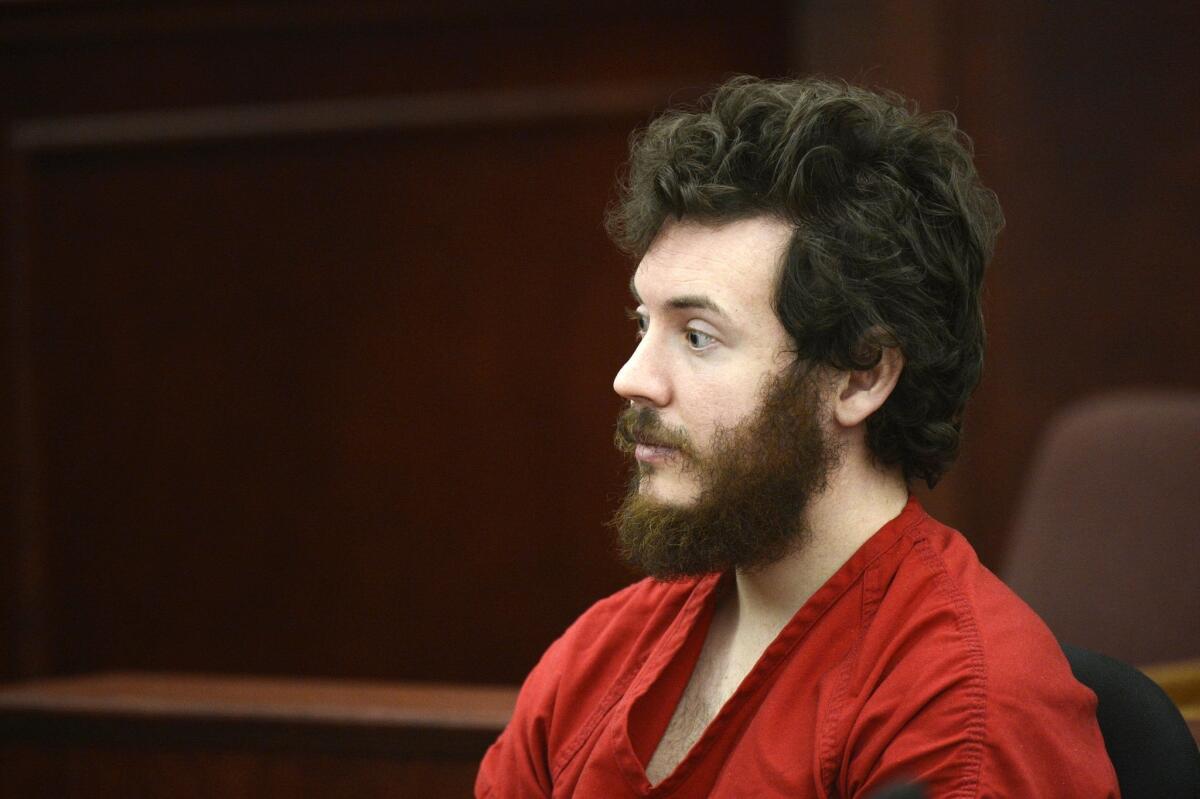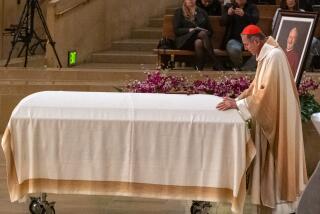Judge bars James Holmes’ attorneys from psychiatric exams

- Share via
CENTENNIAL, Colo. -- The judge in the James E. Holmes case has ruled that defense attorneys will not be allowed to attend the defendant’s psychiatric examination because of concerns they would “inevitably interfere.”
District Judge Carlos Samour Jr. agreed with officials from the state psychiatric hospital who thought that Holmes’ lawyers might coach him on how to answer certain questions or advise him not to answer -- actions that could influence the outcome of their evaluation.
Samour also rejected the defense claim that Holmes’ lawyers must be present at the state-ordered psychiatric evaluation to ensure his constitutional rights against self-incrimination.
“While it may be strategically beneficial for the defendant to have his attorneys and investigator in attendance at the examination, he is not entitled to have them present,” Samour wrote in his Wednesday ruling.
On June 4, Samour accepted Holmes’ revised plea of not guilty by reason of insanity, setting in motion a commitment order to the Colorado Mental Health Institute at Pueblo to undergo a series of rigorous evaluations to determine his sanity.
Holmes, 25, is accused of opening fire in a packed movie theater in Aurora last summer, killing 12 and injuring 70. He faces 166 counts of first-degree murder, attempted first-degree murder and weapons charges in connection with the July 20 massacre.
If convicted, he could face the death penalty. But by law, if he is found to suffer from a mental illness or is determined to have been insane at the time of the massacre, he cannot be put to death. The conclusions of his psychiatric exam could be crucial to both sides.
The prosecution has painted Holmes, a former neuroscience doctoral student at the University of Colorado-Denver, as having a brilliant mind that turned murderous as he began to fail at school. Testimony at a January preliminary hearing revealed that he had meticulously planned the attack for months, amassing an arsenal of weapons well before July 20.
The defense, however, has said Holmes is deeply mentally ill. A successful insanity plea would prove that he did not know right from wrong when the crime happened.
Defense lawyers asked to attend the exam so they could “advise” him on how to proceed during testing. They have repeatedly challenged the constitutionality of state insanity defense laws. If Holmes does not cooperate with any part of the testing, they questioned whether it would later be held against him.
It is that defense position that sparked concern from William May, superintendent of the Pueblo state hospital. In a June 10 letter to Samour, May urged the judge to deny the defense request because he feared the lawyers would not only interfere with examiners but that they might “censor” or “shape” Holmes’ answers, clouding the assessment.
Ultimately Samour agreed with May, saying he, too, was worried their presence could “adversely affect reliability and accuracy” of the exam. The judge added in his ruling that defense attorneys could later cross-examine the psychiatric evaluators at trial if they disagreed with the procedure or findings.
In a second letter to Samour, May asked the judge to extend the deadline for the examination until Sept. 16. May said a forensic psychiatrist has been assigned to the case but the vast amounts of documentation and evidence in connection with the case had slowed the timeline.
Previously, a deadline of August had been set.
May said in his letter that in addition to a forensic psychiatrist, Holmes will also be examined by a psychologist and neuropsychologist.
A hearing on the delay is scheduled for next week.
Samour has set the trial for Feb. 3, 2014. But because of the complexities of both the insanity plea and potential death penalty, many legal experts predict it will be delayed.
ALSO:
All-women jury selected in George Zimmerman murder trial
Oregon’s top court upholds governor’s right to block execution
Feisty, folksy Facebook page makes Ohio cop ‘Internet sensation’
More to Read
Sign up for Essential California
The most important California stories and recommendations in your inbox every morning.
You may occasionally receive promotional content from the Los Angeles Times.










